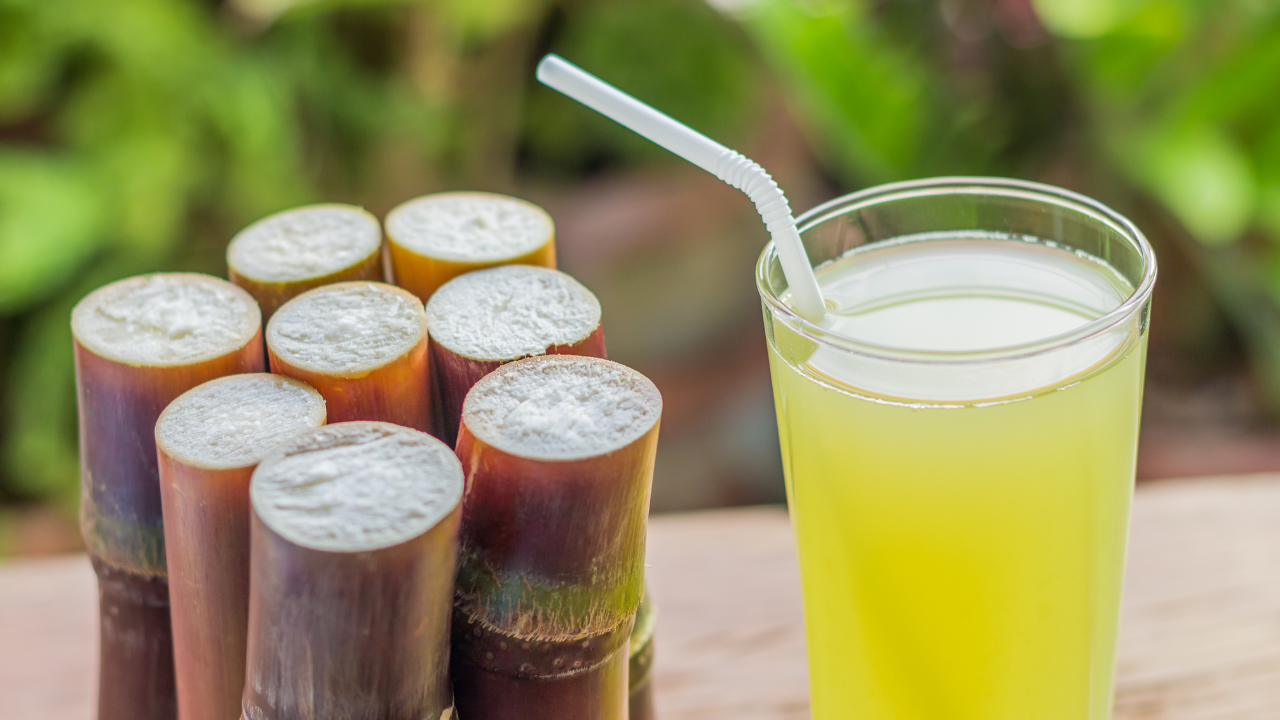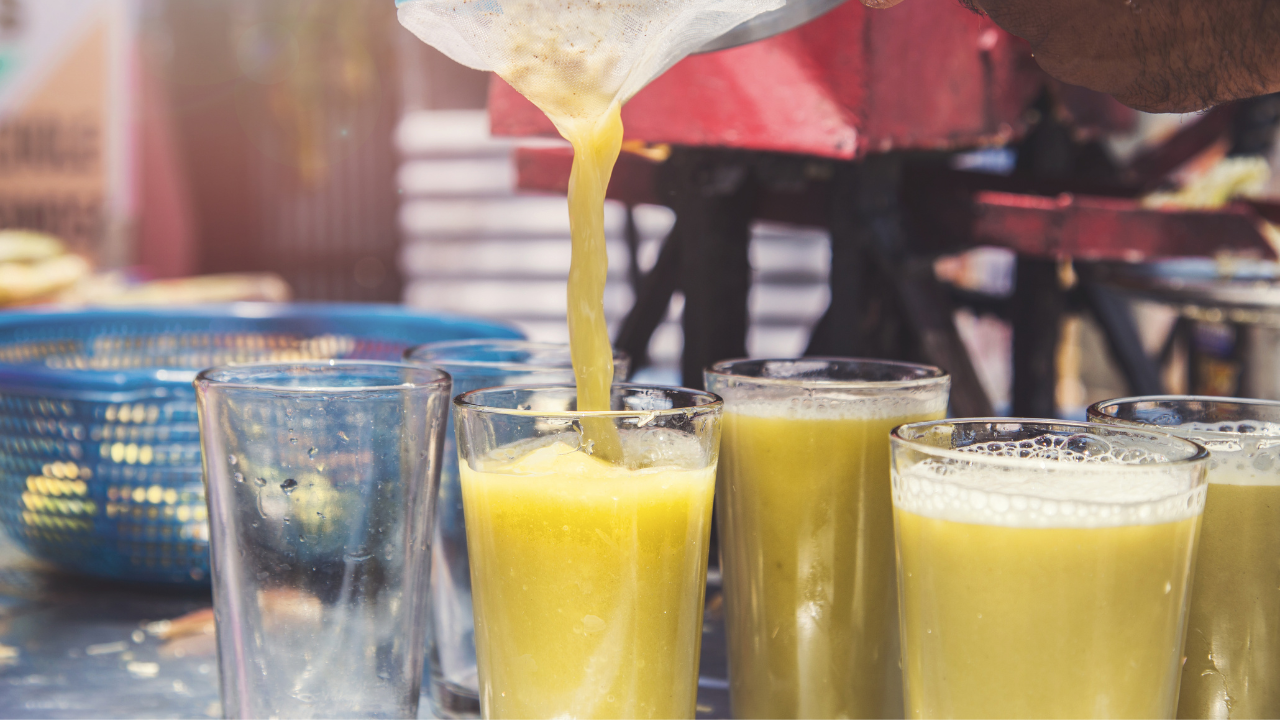
Post by : Kanchan Chandel
Flavored waters are another category of beverages that can be misleading. Marketed as a healthier alternative to sodas, these drinks often contain added sugars or artificial sweeteners. While they may seem like a good way to stay hydrated, the added ingredients can contribute to the same health issues associated with other sugary drinks.
Energy drinks are popular for their ability to provide a quick boost, but they come with significant downsides. Loaded with sugar, caffeine, and other stimulants, energy drinks can lead to increased heart rate, high blood pressure, and insomnia. The high sugar content can cause weight gain and elevate the risk of developing type 2 diabetes.
Excessive sugar intake from beverages doesn't just affect physical health; it can also impact mental well-being. High sugar consumption has been linked to an increased risk of depression and anxiety. The rapid fluctuations in blood sugar levels can lead to mood swings and irritability, affecting overall mental health.
The beverage industry spends billions on marketing to convince consumers that their products are not only desirable but also essential. Celebrity endorsements, flashy advertisements, and strategic product placements can influence our choices, making it difficult to resist these sugary drinks. Awareness of these marketing tactics can help you make more informed decisions.
Choosing sugary beverages not only impacts your health but also has broader economic and environmental implications. The production and disposal of plastic bottles contribute to environmental pollution, while the medical costs associated with treating diseases linked to sugary drinks place a significant burden on healthcare systems.

In response to the growing health crisis caused by sugary drinks, some governments have implemented regulations and public health campaigns to reduce consumption. Sugar taxes, clear labeling, and restrictions on marketing to children are some measures that have been adopted in various regions. These initiatives aim to educate the public and encourage healthier beverage choices.
Beverages often play a central role in social interactions and cultural practices. Reducing sugary drink consumption doesn't mean you have to forgo social enjoyment. Opting for healthier alternatives like herbal teas, infused waters, or freshly squeezed juices can still provide enjoyment and refreshment during social gatherings.
Creating lasting change in your beverage habits involves building new routines. Start by incorporating healthier drinks into your daily life. For example, begin your day with a glass of water instead of juice or soda, and carry a reusable water bottle to ensure you stay hydrated throughout the day.
Instilling healthy beverage habits in children is crucial for their long-term health. Encourage kids to drink water, milk, or natural fruit juices instead of sugary drinks. Educating them about the impact of sugary beverages can help them make better choices as they grow older.
Overall, reducing the consumption of sugary beverages is just one aspect of a healthier lifestyle. Pair this change with a balanced diet, regular physical activity, and adequate sleep to enhance your overall well-being. By making conscious choices and prioritizing your health, you can lead a more vibrant and fulfilling life.
Sugarcane juice, with its sweet and refreshing taste, is a popular beverage, especially in tropical regions. It's often marketed as a natural and healthy drink, but there's more to the story than meets the eye. While it may seem like a healthy choice, the high sugar content in sugarcane juice can have serious consequences for your health.
A single glass of sugarcane juice contains a surprising amount of sugar, often exceeding the recommended daily intake for an average adult. This can lead to a rapid spike in blood sugar levels, which is particularly concerning for people with diabetes or those at risk of developing the condition. The natural sugars in sugarcane juice are absorbed quickly into the bloodstream, causing these spikes.
Regular consumption of sugarcane juice can contribute to weight gain. The high-calorie content of the sugar, coupled with the absence of fiber, means that the body stores the excess sugar as fat. Over time, this can lead to obesity, which is a risk factor for many other health problems, including heart disease, hypertension, and certain types of cancer.
Sugarcane juice can also be detrimental to your dental health. The high sugar content provides a feast for the bacteria in your mouth, leading to the production of acids that erode tooth enamel. This can cause cavities and tooth decay. Consuming sugarcane juice regularly without proper dental hygiene can significantly increase your risk of developing dental issues.
While sugarcane juice does contain some vitamins and minerals, such as potassium, calcium, and magnesium, these benefits are often overshadowed by the high sugar content. Drinking too much sugarcane juice can lead to an imbalance in your diet, where the intake of sugar outweighs the benefits of the nutrients it provides. This imbalance can have a negative impact on your overall health and nutrition.
Sugarcane juice is often sold by street vendors and may not always be prepared under hygienic conditions. This increases the risk of contamination with harmful bacteria and other pathogens. Consuming contaminated sugarcane juice can lead to foodborne illnesses, causing symptoms like stomach cramps, diarrhea, and vomiting.
Given the hidden dangers of sugarcane juice, it's wise to consider healthier beverage options. Water remains the best choice for hydration. If you crave something sweet, try infusing water with slices of fruit or herbs to add flavor without the added sugar. Herbal teas and homemade smoothies made with low-sugar fruits and vegetables are also excellent alternatives.
In today's fast-paced world, soft drinks have become a go-to refreshment for millions of people. With their enticing fizz and wide array of flavors, they seem like the perfect way to quench your thirst. However, beneath the surface, these sugary beverages pose a significant threat to public health. Let's explore the various ways soft drinks are contributing to a growing health crisis and why it's time to reconsider our consumption habits.
One of the most glaring issues with soft drinks is their high sugar content. A single can of soda can contain up to 10 teaspoons of sugar, far exceeding the recommended daily sugar intake. This excessive sugar consumption can lead to a host of health problems, including obesity, diabetes, and heart disease. When you drink a soft drink, the sugar rapidly enters your bloodstream, causing a spike in blood glucose levels. Over time, this can lead to insulin resistance, a precursor to type 2 diabetes.
Soft drinks are often referred to as "empty calories" because they provide energy without any nutritional benefits. These empty calories can quickly add up, leading to unwanted weight gain. Unlike foods that make you feel full, soft drinks don't curb your appetite, making it easy to consume them alongside your regular meals. This can result in a calorie surplus and subsequent weight gain, contributing to the obesity epidemic.
Many soft drinks contain caffeine, which can create a dependency similar to that seen with coffee. While a moderate amount of caffeine can have some benefits, the levels found in soft drinks can lead to dehydration, jitteriness, and sleep disturbances. Moreover, the combination of caffeine and sugar can create a cycle of addiction, where you feel the need to consume more to maintain your energy levels throughout the day.
Soft drinks are highly acidic, which can wreak havoc on your dental health. The acidity, combined with the high sugar content, creates the perfect environment for tooth decay and enamel erosion. Regular consumption of soft drinks can lead to cavities, tooth sensitivity, and even gum disease. Dental problems can be both painful and costly to treat, making it essential to protect your oral health by limiting soft drink intake.
Another lesser-known consequence of regular soft drink consumption is its impact on bone health. Many soft drinks contain phosphoric acid, which can interfere with the body's ability to absorb calcium. Over time, this can weaken bones and increase the risk of osteoporosis, especially in older adults. Maintaining strong bones requires adequate calcium intake and limiting substances that hinder its absorption.
Beyond personal health, soft drinks also have a significant environmental impact. The production and disposal of plastic bottles and aluminum cans contribute to pollution and waste. Additionally, the high demand for these beverages drives the extraction of natural resources, such as water and sugar, often in unsustainable ways. By reducing soft drink consumption, you can also contribute to a healthier planet.
The good news is that there are plenty of healthier alternatives to soft drinks that can satisfy your thirst without compromising your health. Water should be your go-to beverage for staying hydrated. If plain water feels too boring, try infusing it with fresh fruits, herbs, or cucumber slices for a refreshing twist. Herbal teas, coconut water, and naturally flavored sparkling water are also excellent options that provide hydration and nutrients without the added sugar and calories.
Switching away from soft drinks may seem challenging at first, especially if you're used to the sweet taste and convenience. However, taking small steps can make a big difference. Start by gradually reducing your intake, replacing one soft drink a day with a healthier option. Over time, your taste buds will adjust, and you'll find that you no longer crave the excessive sweetness of soft drinks.
Soft drinks may offer a momentary pleasure, but their long-term impact on health is far from beneficial. By understanding the risks and making conscious choices, you can protect your health and well-being. Prioritizing healthier beverages can lead to improved energy levels, better weight management, and a reduced risk of chronic diseases. Let's make a collective effort to move away from the sugary allure of soft drinks and embrace a healthier lifestyle.
In our fast-paced lives, reaching for a refreshing drink is a common habit. However, many popular beverages are not as healthy as they seem. Let's dive deeper into some of these drinks, examining what makes them appealing and why they might not be the best choice for your health.
Fruit juices are often marketed as a healthy option, brimming with vitamins and nutrients. While they do contain some essential vitamins like vitamin C, many store-bought fruit juices are packed with added sugars. Even those labeled as "100% fruit juice" can be problematic. The natural sugars in these juices, without the fiber found in whole fruits, can cause rapid spikes in blood sugar levels. This can lead to energy crashes and, over time, contribute to weight gain and an increased risk of diabetes.
Sports drinks like Gatorade and Powerade are designed to replenish electrolytes and hydrate athletes. However, for the average person, these drinks often do more harm than good. They are loaded with sugars and artificial ingredients that can lead to unnecessary calorie intake and potential weight gain. Unless you're engaging in intense physical activity for prolonged periods, water or a homemade electrolyte drink is usually a better choice.
Energy drinks such as Red Bull and Monster promise a quick energy boost, making them popular among students and professionals. However, these drinks contain high levels of caffeine and sugar, which can cause jitteriness, anxiety, and heart palpitations. Over time, excessive consumption can lead to serious health issues, including heart problems and dependency on caffeine.
Flavored coffees from popular chains like Starbucks and Dunkin' Donuts are more like desserts than beverages. These drinks are often packed with syrups, whipped cream, and other high-calorie additives. While they might taste delicious, they can add a significant number of empty calories to your diet. Opting for a plain coffee with a splash of milk and a small amount of sweetener is a much healthier choice.
Sweetened teas, whether bottled or homemade, can contain as much sugar as a can of soda. While tea itself has numerous health benefits, including antioxidants that help protect against disease, adding large amounts of sugar negates these benefits. Unsweetened tea or tea sweetened with a small amount of honey or a natural sweetener is a better option.
Switching to healthier beverage options doesn't have to be difficult. Here are a few simple tips:
Read Labels Carefully: Always check the nutritional information on beverages to understand their sugar and calorie content.
Hydrate with Water: Water is the best choice for hydration. If you find plain water boring, try infusing it with fruits like lemon, berries, or cucumber for added flavor.
Opt for Herbal Teas: Herbal teas come in a variety of flavors and can be enjoyed hot or cold without the need for added sugar.
Make Your Own Drinks: Prepare smoothies or juices at home using fresh fruits and vegetables. This way, you can control the amount of sugar and avoid artificial additives.
Finding healthier alternatives to sugar-laden beverages is a crucial step towards better health. With a little creativity and mindfulness, you can easily transition to drinks that nourish your body without compromising on taste.
Water is the most natural and essential beverage for our bodies. Staying hydrated with water supports every bodily function, from digestion to circulation. To make it more appealing, try infusing your water with slices of fruits like lemon, lime, or berries. Adding a few mint leaves or a slice of cucumber can also give it a refreshing twist, making it easier to meet your daily hydration needs without added sugars.
Herbal teas are an excellent alternative to sugary drinks. They come in various flavors and offer numerous health benefits. Chamomile tea, for instance, is known for its calming properties, while peppermint tea can aid digestion. Green tea is rich in antioxidants and can boost your metabolism. These teas can be enjoyed hot or cold, and adding a slice of lemon or a bit of honey can enhance their flavor without adding too much sugar.
Coconut water is a fantastic natural alternative to sugary sports drinks. It is packed with electrolytes, making it an excellent choice for rehydration after exercise. Unlike commercial sports drinks, coconut water is low in sugar and calories. It also contains potassium, which is crucial for maintaining proper heart and muscle function. Always opt for pure coconut water without added sugars or flavors to maximize its health benefits.
Homemade smoothies are a great way to enjoy a nutritious and delicious beverage. You can control the ingredients to ensure they are healthy and low in sugar. Start with a base of unsweetened almond milk, coconut milk, or plain yogurt. Add in a variety of fruits and vegetables like spinach, kale, berries, and bananas. For added protein, consider adding a spoonful of nut butter or a scoop of protein powder. This way, you get a balanced drink that can serve as a meal or a snack.
For those who miss the fizz of soft drinks, sparkling water can be a wonderful alternative. It offers the same refreshing carbonation without the added sugars and artificial ingredients. You can enhance its flavor by adding a splash of natural fruit juice or a few slices of fresh fruit. There are also many flavored sparkling waters available that do not contain added sugars or artificial sweeteners, providing a healthier way to enjoy a bubbly drink.
Vegetable juices, particularly those made from green vegetables like spinach, kale, cucumber, and celery, are low in sugar and high in essential nutrients. These juices can be a great way to increase your vegetable intake and stay hydrated. To add some sweetness without too much sugar, include a small piece of fruit like apple or pear. Be sure to consume these juices fresh to maximize their nutritional benefits.
Kombucha, a fermented tea beverage, is rich in probiotics which are beneficial for gut health. It has a slightly tangy taste and natural effervescence, making it an enjoyable alternative to sugary drinks. While kombucha can contain some natural sugars from the fermentation process, it is generally much lower in sugar than soft drinks and other popular beverages. Look for brands with no added sugars and enjoy it in moderation.
Switching from sugary drinks to healthier options might feel overwhelming, but with a few simple strategies, you can make the shift smoothly. Here’s how to start your journey towards better health and hydration.
The first step to cutting out sugary drinks is to start small. If you're used to having a soft drink with every meal, begin by replacing one of those servings with water or an unsweetened beverage. Gradually increase the number of meals where you opt for the healthier choice.
If plain water feels too boring, try infusing it with natural flavors. Adding slices of fruits like lemon, lime, or berries can make water more appealing. Herbs such as mint or basil and vegetables like cucumber can also add a refreshing twist. These infusions can make your hydration routine enjoyable and flavorful without any added sugar.
Herbal teas are a fantastic alternative to sugary drinks. They come in various flavors, are caffeine-free, and offer numerous health benefits. Try chamomile for relaxation, peppermint for digestion, or hibiscus for a tangy and vitamin-rich option. Drinking herbal tea can become a comforting ritual, helping you steer clear of sugar-laden beverages.
If you need a hint of sweetness, consider natural sweeteners like honey or stevia. While it’s best to reduce overall sugar consumption, these alternatives can help ease the transition. For instance, adding a small amount of honey to your tea or a smoothie can satisfy your sweet tooth without the harmful effects of refined sugar.
Homemade smoothies can be a great way to replace sugary drinks. Use a mix of low-sugar fruits like berries, along with greens like spinach or kale, and a base of water, coconut water, or unsweetened almond milk. This combination provides hydration, fiber, and essential nutrients without the sugar spike you get from soft dr inks or commercial fruit juices.
inks or commercial fruit juices.
Educate yourself on reading nutrition labels. Look out for hidden sugars listed under various names like high-fructose corn syrup, sucrose, or agave nectar. Being mindful of what you’re consuming can help you make better choices.
Preparation is key to making the shift to healthier beverages. Keep a water bottle with you at all times and prepare infusions or herbal teas in advance. This ensures you always have a healthy option on hand, reducing the temptation to grab a sugary drink when you’re thirsty.
Involve friends and family in your journey towards healthier drinking habits. Encouraging each other can make the transition easier and more enjoyable. Share tips, recipes, and experiences to stay motivated. Celebrate small victories and recognize the positive changes in your health and energy levels.
Experiment with different healthy beverages to find what you enjoy most. Whether it’s a refreshing herbal tea, a vibrant smoothie, or flavored water, discovering new favorites can make the shift feel less like a sacrifice and more like an exciting adventure.
Making the shift to healthier beverages is not about deprivation but about finding new ways to enjoy drinks that support your health and well-being. By starting small, staying prepared, and exploring a variety of options, you can gradually reduce your reliance on sugary drinks and embrace a healthier lifestyle.
When it comes to our beverage choices, the bottom line is clear: opting for healthier options can significantly impact our overall well-being. While sugarcane juice, soft drinks, and popular beverages may seem like convenient options, their long-term effects on health can be far-reaching and concerning. Here are a few more points to consider:
Sugary drinks like sugarcane juice and soft drinks are loaded with empty calories and offer little nutritional value. Regular consumption can contribute to weight gain, increase the risk of type 2 diabetes, and lead to other health issues like heart disease and dental problems. Moreover, the caffeine content in many soft drinks can disrupt sleep patterns and exacerbate anxiety.
Even seemingly healthy options like fruit juices can pack a punch when it comes to sugar content. While they may contain essential vitamins and minerals, they lack the fiber found in whole fruits, leading to rapid spikes in blood sugar levels. Moderation is key when it comes to fruit juices, and opting for whole fruits or homemade smoothies can provide the same nutrients without the added sugars.
Transitioning to healthier beverage options doesn't have to be daunting. Water remains the best choice for hydration, and infusing it with fruits or herbs can add flavor without the sugar. Herbal teas, coconut water, and homemade smoothies with low-sugar ingredients are also excellent alternatives that provide hydration and essential nutrients without the drawbacks of sugary drinks.
Making the shift towards healthier beverages doesn't have to happen overnight. Start by gradually reducing your intake of sugary drinks and incorporating more water and other alternatives into your routine. Being mindful of portion sizes and reading labels can help you make informed choices and take control of your beverage consumption.
By prioritizing healthier beverage choices, you're taking a proactive step towards better health and well-being. Understanding the impact of sugary drinks and making informed decisions empowers you to take control of your health journey. Remember, every small change adds up, and by prioritizing your health today, you're investing in a brighter, healthier future.
Finally, don't hesitate to seek support from friends, family, or healthcare professionals as you embark on your journey towards healthier beverage choices. Making changes to your lifestyle can be challenging, but having a supportive network can make all the difference. Together, you can celebrate your successes and navigate any obstacles along the way.
ICMR's Recommendations
Limit Consumption: It's crucial to keep a check on how much sugarcane juice, soft drinks, and other sugary beverages we consume. These drinks might seem refreshing, but too much of them can lead to serious health issues down the road. It's like indulging in a treat occasionally rather than making it a daily habit.
Opt for Healthier Alternatives: Instead of reaching for that can of soda or sugary juice, consider healthier options like water, herbal teas, or coconut water. These alternatives not only quench your thirst but also provide essential hydration without the added sugars and chemicals found in sugary drinks. Plus, they can be just as tasty and satisfying!
Read Labels: Don't just grab any drink off the shelf without checking the label first. Take a moment to read the nutritional information and ingredients list. Look out for sneaky sugars hiding under names like "corn syrup," "fructose," or "sucrose." Being aware of what goes into your body is the first step towards making healthier choices.
Educate the Public: Knowledge is power, and spreading awareness about the risks associated with sugary drinks is key to helping people make informed decisions. Public health campaigns, school programs, and community initiatives can all play a role in educating individuals about the importance of choosing healthier beverages. It's about empowering people to take control of their health and well-being.
By following these recommendations, we can all take small but significant steps towards improving our overall health and reducing the impact of sugary drinks on our lives. Let's drink to our health with smarter choices and a brighter, sugar-free future!
Summary:
This comprehensive article explores the hidden dangers of sugarcane juice, soft drinks, and other popular beverages, emphasizing the detrimental effects they can have on our health. It delves into various aspects, such as the high sugar content, impact on mental health, environmental considerations, and government regulations. Additionally, it provides insights into healthier alternatives and practical tips for making the transition towards better beverage choices. By understanding the risks associated with sugary drinks and empowering readers to prioritize their health, the article aims to promote informed decision-making and a healthier lifestyle.
Disclaimer:
The information provided in this article is for general informational purposes only and should not be considered medical advice. DXB News Network aims to deliver accurate and reliable information but makes no warranties regarding the completeness or accuracy of the content. Readers are encouraged to consult with healthcare professionals before making any changes to their diet or beverage consumption. Additionally, individual needs and circumstances may vary, so it's essential to consider personal health factors when making decisions about beverage choices.

IKEA India Leases 37K Sq Ft in Pune Mall for City Store
IKEA India secures 37,259 sq ft at Phoenix Marketcity, Pune, marking a key step in its city-store ex

UAE-Oman Rail Freight Service Set to Boost Regional Trade
Noatum Logistics and Hafeet Rail partner to start UAE-Oman rail freight, enhancing trade, supply cha

Kosovo President Meets Saudi Minister to Strengthen Ties
Kosovo President Vjosa Osmani met Saudi Minister Faisal Alibrahim to strengthen economic ties and ex

TV Star Paridhi Sharma Enters Films with Controversial Haq
Paridhi Sharma marks her film debut with Haq inspired by the Shah Bano case while facing legal hurdl

ChatGPT Voice Mode Set for Major Upgrades This Month
ChatGPT voice mode gets real-time transcripts, mute/unmute options, rich content, and direct messagi

Doncic Scores 49 as Lakers Beat Timberwolves 128-110
Luka Doncic scores 49 points, Lakers shoot 59% to beat Timberwolves 128-110; Austin Reaves, Rui Hach

iOS 26 Adaptive Power iPhones Get Longer Battery Life
iOS 26 brings Adaptive Power to iPhones, extending battery life intelligently without affecting perf

Doncic Scores 49 as Lakers Beat Timberwolves 128-110
Luka Doncic scores 49 points, Lakers shoot 59% to beat Timberwolves 128-110; Austin Reaves, Rui Hach

Sacramento Kings Beat Utah Jazz 105-104 with Late Sabonis Shot
Domantas Sabonis scores game-winner as Kings beat Jazz 105-104 in home opener, Zach LaVine and Malik

Messi’s Argentina Match in India Postponed, New Date Soon
Argentina’s friendly against India in Kochi is postponed due to FIFA approval delays; organizers wil

Rohit and Kohli End ODI Careers in Australia with Win
Rohit Sharma and Virat Kohli bid farewell to Australian ODIs after a final win, forming a 168-run un

George Russell Sneaks into Mexican GP Stands in Wrestling Mask
George Russell wore a Mexican wrestling mask to watch practice from the stands during the Mexican Gr

Dutch Cyclists Van de Wouw and Wiebes Win Second World Titles
Dutch riders Hetty van de Wouw and Lorena Wiebes win second world titles at UCI Track Cycling Champi

Williamson Returns to New Zealand Squad for ODI Series
Former captain Kane Williamson returns for ODIs against England, balancing family, pro leagues, and

Services Bowlers Make History With Two Hat-Tricks in Assam
Services bowlers Arjun Sharma and Mohit Jangra achieved two hat-tricks in Assam’s Ranji Trophy match